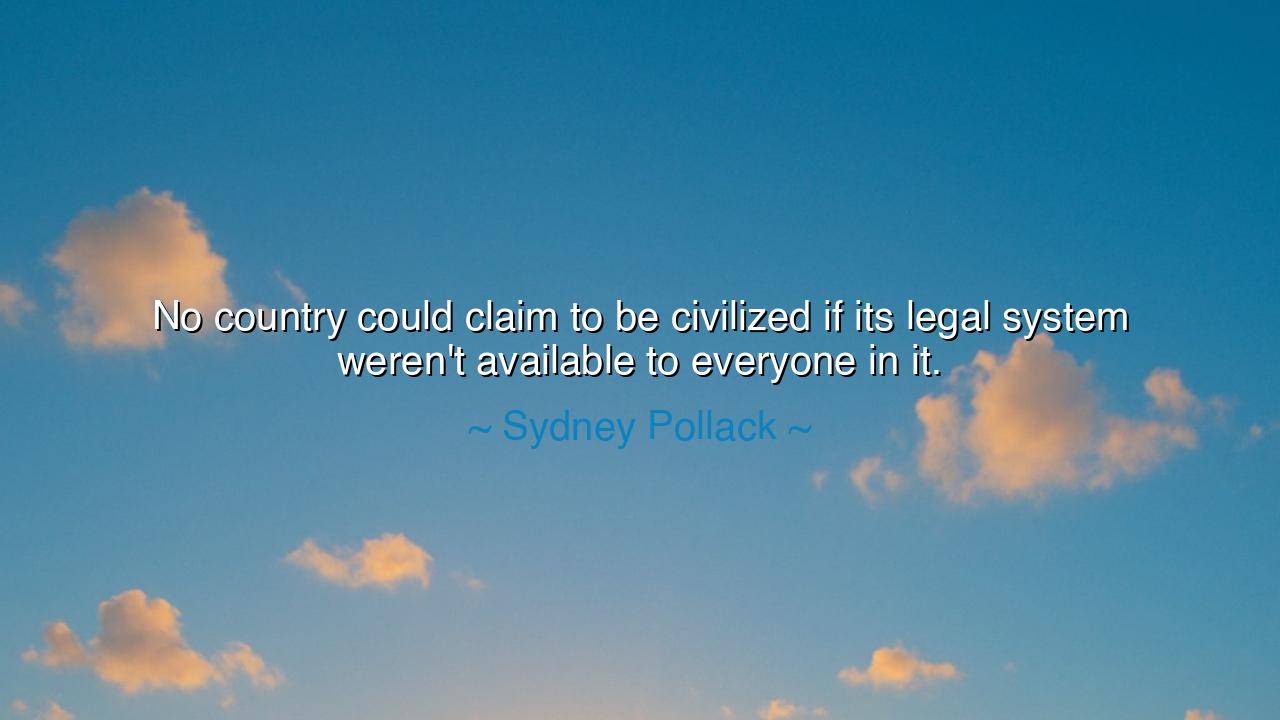
No country could claim to be civilized if its legal system
No country could claim to be civilized if its legal system weren't available to everyone in it.






The words of Sydney Pollack, “No country could claim to be civilized if its legal system weren’t available to everyone in it,” are both a declaration and a judgment — a mirror held to the soul of every nation that calls itself just. They resound like a bell of conscience, reminding us that civilization is not measured by wealth or monuments, but by justice, and justice is nothing if it is not accessible. Pollack, a storyteller of human truths, speaks here not as a jurist, but as a philosopher of compassion — one who understood that the true greatness of a people lies not in their power, but in how they protect the powerless. His words rise from the deep moral soil of democracy, where the law is not a weapon of the mighty, but the shelter of the many.
The origin of this quote springs from Pollack’s lifelong concern with fairness and humanity, themes that coursed through his films as they do through the best of civilization itself. Known as both filmmaker and moral observer, Pollack’s works often explored the struggles of individuals caught within the machinery of institutions — the lonely journalist in Three Days of the Condor, the striving actor in Tootsie, the weary lawyer in The Firm. Through his art, he revealed that the human spirit is often tested not by nature’s cruelty, but by society’s indifference. This quote, spoken later in his career, distilled his understanding: that without an open and equitable legal system, even the grandest republic is but a polished tyranny. For what is civilization, if not the triumph of fairness over chaos, and of law over fear?
Pollack’s words remind us of a truth the ancients once knew well — that justice is the foundation of civilization. The Greeks built their city-states around the concept of dike, the divine order of fairness. The Romans carved their laws into stone, so that all citizens, high and low, might know their rights. Yet even they stumbled when the law served only the few. Every empire that has ever fallen — from Rome to the British Raj — first began to crumble when the scales of justice tilted toward the powerful. A nation that denies equal access to law, Pollack warns, is like a grand temple built on sand; its pillars may gleam in sunlight, but they cannot stand when storms of injustice come.
Consider the story of Clara Shortridge Foltz, the first female lawyer in California, who in the 19th century saw how the poor were crushed by the cost of defense. She fought not only to practice law, but to ensure that every person, regardless of wealth, had the right to representation. From her struggle came the idea of the public defender, a reform that spread across America and reshaped its concept of justice. Her fight embodies Pollack’s wisdom: that a nation is not civilized because it has courts, but because those courts are open to all who seek them. The poor, the voiceless, the accused — these are the truest test of a legal system’s heart.
Pollack’s words also carry a warning for the modern age, where laws can grow so complex that only the privileged can afford to navigate them. The law that becomes a labyrinth ceases to be a light. It becomes a trap. In such times, the spirit of equality before the law must be rekindled — not as rhetoric, but as practice. True civilization requires that justice descend from the marble halls of the elite and walk among the people: in the worker’s grievance, the refugee’s plea, the prisoner’s cry. It demands that we measure not how well the powerful are served, but how deeply the weak are heard.
For what Pollack reminds us is eternal: law must be a bridge, not a wall. Its purpose is not to exalt a class, but to bind a community together under the covenant of fairness. A civilization worthy of its name cannot turn its face from the poor, nor silence those who suffer injustice in its midst. The right to seek justice is the right to be seen as fully human — and to deny it is to wound the very spirit of humanity itself. The greatness of a nation lies not in how fiercely it defends its borders, but in how faithfully it defends its people’s rights.
Let this teaching be passed down like an oath: if you would call your land civilized, make its justice accessible. Support the defenders who speak for those who cannot. Stand watch over the law, that it never hardens into privilege. Teach your children that civilization is not inherited — it is built, daily, through compassion, fairness, and vigilance. As Sydney Pollack teaches us, a nation’s truest monument is not its skyline, nor its armies, but the simple assurance that every soul within its borders, rich or poor, strong or frail, can walk into the hall of justice and be heard. That is the mark of a truly civilized world.






AAdministratorAdministrator
Welcome, honored guests. Please leave a comment, we will respond soon